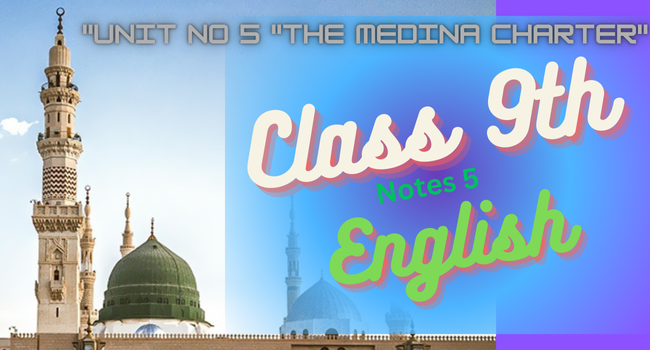Class 9th English Notes Unit No. 5 “The Medina Charter”
Unit No. 5, “The Medina Charter,” is an important chapter for Class 9th students, focusing on the principles of equality, justice, and harmony. To understand this historical document better, students need well-organized study notes. These Class 9th notes explain the key points and events in a simple way, making it easier to grasp the main ideas. With the help of these 9th class English notes, students can prepare effectively and achieve excellent results. Using the best study notes, students can save time and ensure success in their exams with confidence.
Q1. Why did the Holy Prophet (SAW) abolish the tribal distinction Medina?
Ans. REFERENCE:
This question has been taken from the lesson “The Madina Charter”.
Abolishment of tribal distinction:
In order to create harmony and co-operation, the Holy Prophet (SAW) abolished the tribal distinction and grouped the inhabitants of Medina under the new name “Ansar or Helpers”.
Q2. What did UN adopt unanimously?
Ans. REFERENCE:
This question has been taken from the lesson “The Madina Charter”.
The Adaptation of the U.N:
In 1948, the General Assembly of the United Nation unanimously adopted the Universal Declaration of Human Rights. The declaration proclaims the religious, personal, civic, political, economic, social and cultural rights of human beings.
Q3. How do we know that Islam is the protector of Human Rights?
Ans. REFERENCE:
This question has been taken from the lesson “The Madina Charter”.
Islam as the Protector of Human Rights:
It is a fact that Islam emphasizes on the great principles of civic equality, freedom of worship, religious and social tolerance. It was more elaborated when the clauses of the Medina Charter were incorporated in the Universal Declaration of Human Rights by the U.N. It shows that Islam is the greatest protector of Human Rights.
Q4: Define tolerance and give examples from the text.
Ans. REFERENCE:
This question has been taken from the lesson “The Madina Charter”.
Tolerance:
It means a fair and objective attitude towards those whose life style differs from ours.
Tolerance is the virtue which enables a person to forbear the attitude, negative remarks and action with patience and calmness.
Examples:
- All the communities signing the charter would form the common brotherhood.
- The Muslims, the Jews and other communities of this republic should be free to profess their own respective religion and perform religious ceremonies.
Q5. We must always honour our word. Why?
Ans. REFERENCE:
This question has been taken from the lesson “The Madina Charter”.
Reason to Honour our Words
Both Quran and Hadiths teach us to honour our words. It is the spirit of the teaching of Islam. It is also a matter of self-respect and dignity. If we ignore it, it will lead to collision and disturbance in society.
Q6: Write an account of tolerance you have shown/seen.
Ans. REFERENCE:
This question has been taken from the lesson “The Madina Charter”.
Account of Tolerance:
One day I was standing before the accountant of the School to submit my fee. In the meantime, a parent of a student came to the accountant. Being elder to me, I gave up my turn to him. When he delivered the fee bill and amount to the accountant, the accountant became very angry to him and exchanged harsh words with him on account of late and 5 months outstanding dues. But the man remained silent and tolerated his harsh language. I was very impressed by his behaviour.
